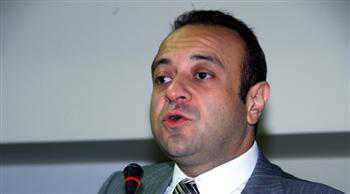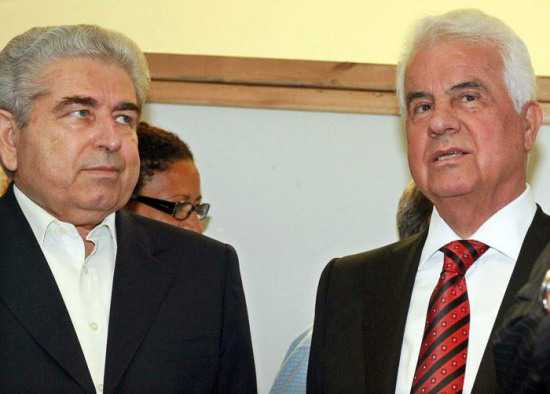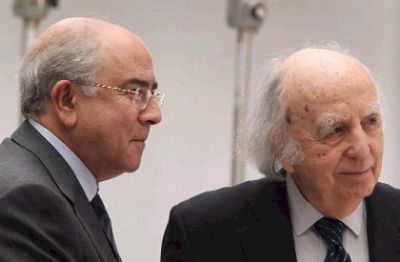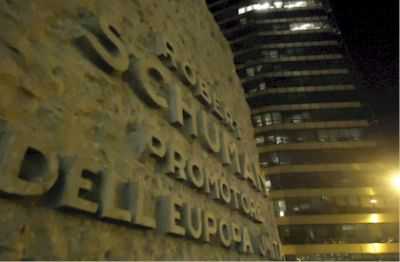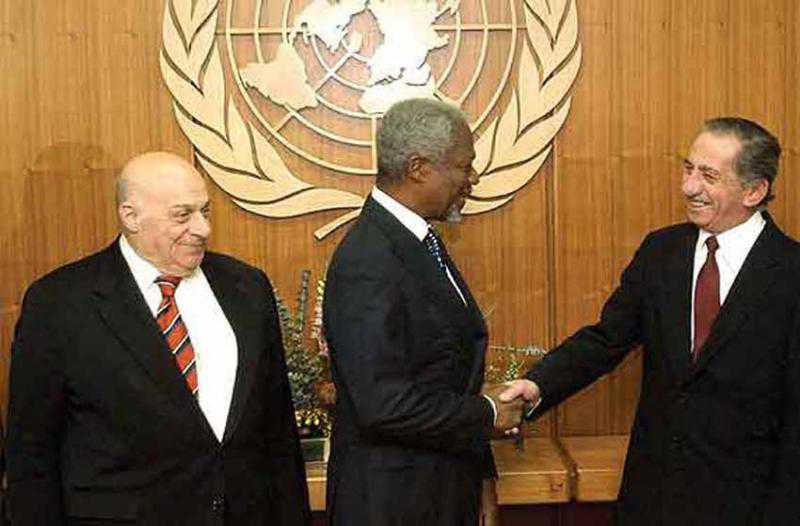By Makarios Droushiotis Published on January 22, 2012
Rauf Denktash (L), with form UN Secretary General Kofi Annan and former President Tassos Papadopoulos
RAUF Denktash has left an indelible mark on the history of the Republic. Together with Archbishop Makarios, he shaped the political realities of our country such as they are today.
The son of a judge, Denktash graduated from the English School before going on to study law in England. Eloquent, sharp, hard-working and goal-oriented, it was he who transformed the Muslim population of Cyprus into a Turkish population.
Since his death, Denktash has been portrayed as the villain in the Greek Cypriot press for his part in the island’s history. In reality, Denktash would never have accomplished much on his own. In every contest, one needs an adversary. Denktash did for his community what Makarios did for the Greek Cypriots. The former sought partition, the latter Enosis (union with Greece). Makarios backed EOKA, while Denktash supported the TMT organisation. Fighters or terrorists, depending on the point of view.
The Zurich agreements of 1959 that led to the declaration of the independence of Cyprus fleshed out the balances of the 1950s, tilting them in favour of the shrewder player. When Denktash began his struggle with the Turkish Cypriots, they were a minority. By the time he was done, the Turkish Cypriots had become a community of equal political standing with the Greek Cypriots and partners in the bi-communual Republic of Cyprus.
At the back of his mind, Makarios was betting on taking the game into extra time, but Denktash was more than eager to play that game. Today, it is a well-documented fact that Makarios signed the Zurich agreements so that he could return to Cyprus as president and subsequently revise the agreements in order to restore the balance to the pre-EOKA period: a majority and a minority. Denktash read this, and saw the opportunity to gamble for more than what he had won in Zurich. In 1963 Makarios proposed 13 amendments to the Constitution, ostensibly to make it more functional. He had ulterior motives, obviously. Once the system established by the Zurich agreements collapsed, both sides were ready for a new showdown.
Refusing to settle for Greek hegemony, Denktash sought vigorously to turn the tables by integrating Cyprus into broader regional politics. Through their connection to Turkey, the Turkish Cypriots – once a minority – became a majority in the region.
Denktash rejected the concept of a common ancestry; as he once put it, the only truly Cypriot species on the island was the native donkey. To him, the separation of the Greek and Turkish populaces was a lifelong dream, and he succeeded in realising it.
The Turkish deep state was Denktash’s most steadfast ally in this long-running conflict. Yet it was Greek Cypriot nationalism which did the most to aid his cause. The Greek Cypriot leadership, the church, the media and the education system were all constantly fuelling his ideological struggle. Denktash never wanted for raw material. He could speak and read Greek, and every morning studied the Cypriot press so he knew his adversary inside-out. By contrast, his Greek Cypriot opponents were ignorant about the Turkish Cypriot community. Because of their ignorance, they criminally underestimated the role of Turkey.
One of the core myths of this ignorance, which prevented the Greek Cypriot side from a rational analysis of Turkish policy, was that Turkish policy on Cyprus was monolithic and unwavering.
In reality, Denktash had not always been the favoured son of the Turkish state. He became that along the way, and he had Greek Cypriot nationalism to thank for it. At the beginning of his political career in the 1950s, Denktash had ties to the regime of Turkish Prime Minister Adnan Menderes, with whose help he set up the TMT organisation. The independence of Cyprus in 1960 coincided with a coup in Turkey. Menderes was arrested, sentenced to death and hanged. Denktash then found himself sidelined, and the government of Mustafa Inonu – who supported the implementation of the Zurich agreements in Cyprus – tried without success to disarm the TMT.
Following the events of 1963 the Turkish government forced Denktash into self-exile in Turkey. The year 1964 in Cyprus was full of dramatic events. Georgios Grivas returned to the island. A Greek army division was despatched to Cyprus to keep in check Makarios’ overtures to Moscow, while Turkey looked the other way.
After three years in exile, in 1967 Denktash tried to illegally re-enter Cyprus with the help of the army. He was arrested, held at the old mental hospital (at what is now the site of the planned Qatari investment) and finally deported to Turkey, even though he was a Cypriot citizen. To the Turkish Cypriots, he was already a hero.
The next wave of hostilities that broke out in Kofinou in November 1967 led to a reshuffling of the deck. The Greek division was sent packing, and Denktash returned to the island, legally this time. His reception at Inonu Square marked the largest mass gathering in the history of the Turkish Cypriot community.
In 1968 Denktash began talks with Glafcos Clerides aimed at resolving the Cyprus dispute on the basis of the Zurich agreements.
In 1973 Denktash became the leader of the Turkish Cypriots.
The coup of July 15 1974 that was engineered by the Greek junta changed the situation radically. The date 20 July 1974 was the most important day in the life of Denktash. The Turkish army gained a foothold in Cyprus, forcing out the Greek population from the northern part of the island. It was out of the ashes of this tragedy that Denktash forged his empire. The Turkish state in Cyprus, with or without quotation marks or the prefix “pseudo”, became a de facto reality. Makarios, himself in exile in London, proposed an immediate return to the Zurich agreements, but Denktash got his own back by responding that the agreement was now inapplicable. It was his turn to play for time. Denktash’s vision from 1974 until his death was the international recognition of the “state”.
The status quo became the new point of convergence between the nationalists in Cyprus. Greek Cypriot leaders would continue their “unyielding” struggle, while Denktash enjoyed the fruits of “independence” and would assume the position he always craved as part of the leading clique of the Turkish deep state.
Denktash became the hero of Turkish policy, much like Makarios had been for Greece in the 1950s and 1960s.
But the abscess ruptured in the early 2000s when the Turkish Cypriots rose up, having realised after decades of self-delusion that they had no future in a pseudo-state that was under Turkey’s shadow. They wanted to be partners in a true European state.
From his office, Denktash could hear the roar of the crowds demanding a solution and accession to the EU, and saw his own vision shaken to its core; the deep state was also being questioned in Turkey itself with the rise of Recep Tayyip Erdogan.
The Greek Cypriot leadership at the time persisted in a static analysis of developments, convinced that the clash between Erdogan and Denktash was a PR gimmick. In reality, they dreaded any developments and sought out the safety of the status quo. Tassos Papadopoulos, with the support of Demetris Christofias, fiercely resisted any attempt at tearing down the wall. While everyone else was living a dream of reconciliation and reunification, Denktash, who was extremely savvy of Cypriot politics, predicted that “this honeymoon will not last long”.
The year 2004 was the most critical juncture in Denktash’s career. For the first time he and the Turkish generals were unable to impose their policies on the Turkish government, and yet Papadopoulos and Christofias continued to speak of PR games.
Not having got wind that changes were afoot in Turkey, Papadopoulos and Christofias wagered on Denktash’s intransigence and negativity. When things turned out very differently, they were already trapped at Burgenstock, whereas Denktash refused to attend so as to avoid a clash with Turkey. The nationalist camp was gripped by panic. Instead of conducting negotiations, as he had committed to in writing, Papadopoulos talked to Serdar Denktash behind the scenes in a bid to jointly block the process. Eventually, Papadopoulos found an outlet by tapping into people’s fears, and with Christofias’ support he maintained the status quo. Denktash, always a straight talker, expressed his admiration for Papadopoulos, even thanking him in public: “Papadopoulos saved us, and for that I thank him.”
At Denktash’s funeral, Turkish President Abdullah Gul said of the man that he was “one of the true heroes borne of our nation”.
A vindication of the deceased? When it comes to eulogies, perhaps yes, but History is a different matter. In nations such as ours, heroes who brought about national disasters are a dime a dozen, whereas fighters are treated as traitors.
What did Turkey gain from Denktash’s policies? Nothing whatsoever. She lost far more than the conquest of a third of the island. Cyprus neither has the strategic value which was once attributed to it, nor did it ever become the unsinkable NATO aircraft carrier – a myth peddled for decades – nor did it add anything of strategic value in the region.
Cyprus is like a stone in the shoe of a giant, constantly nagging at the giant who is unable to remove his shoe and discard it, because the giant (or Turkey) is incapable of abolishing its own national myth. And the threat of partition for the sake of compromise that would salvage Turkish pride is no longer considered a hazard by Greek Cypriots, but rather as security. That which Greek Cypriot nationalists consider to be Denktash’s total success, once you scratch the surface you realise, is his total failure. And theirs.
Send your comments :


